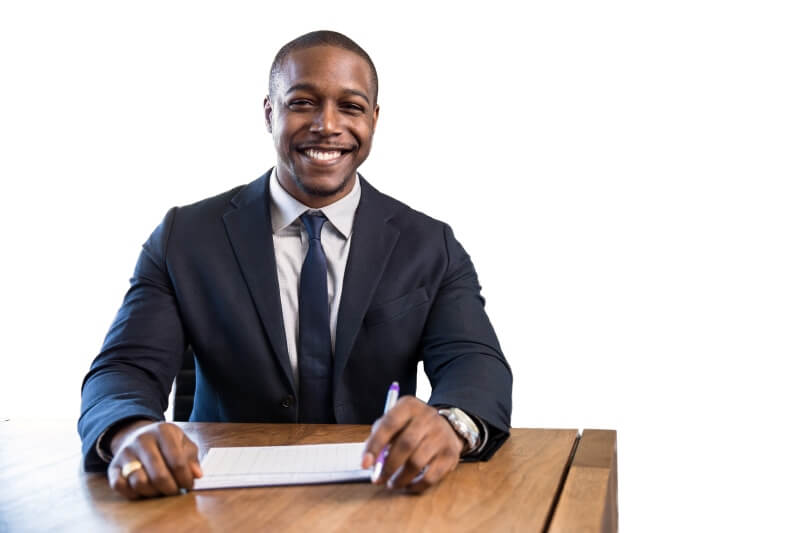Job hunting can be much like a chess game and mastering the etiquette of interviewing can be your winning move. Knowing the intricacies of how to dress, communicate, and follow-up after the interview makes the difference between blending in and standing out. This article delivers no-fuss, practical advice to help you confidently navigate every aspect of the interview process, from a first impression that sticks to a follow up message that resonates. Ready to take control of your interview success? Let’s get started.
Key Takeaways
- Proper etiquette, including non-verbal cues and punctuality, reflects professionalism and impacts the interviewer’s perception of a candidate.
- Appropriate attire, thorough preparation, active listening, and confident communication are crucial components of a successful interview.
- A post-interview follow-up such as a personalized thank-you message can leave a lasting positive impression and emphasize a candidate’s interest in the position.
The Importance of Proper Etiquette in Job Interviews
Understanding the importance of proper etiquette in a job interview is the first step towards a successful interview. Etiquette extends far beyond just polite manners; it acts as a mirror, reflecting your professional demeanor and conviction in your ability to fit into a corporate setting. Non-verbal communication, such as a firm handshake, maintaining eye contact, and warm facial expressions, can enhance your presentation.
Dressing Appropriately for the Interview
How does one portray themself as the best person for the job and present themself in the best light? The first impression you make on an interviewer is often based on your appearance. A key element of interview etiquette, then, is to dress appropriately for your meeting with a company hiring manager. A clean and confident appearance makes an impact for both in-person and virtual job interviews. By understanding the company’s dress code expectations you can avoid being overdressed or underdressed.
Researching the organization and company culture can provide valuable insights into its dress code expectations. The company’s values and mission, often reflected throughout its website and social media, can give you a sense of what attire is appropriate. Employee testimonials and personal anecdotes from those who have worked at the company can further provide an authentic glimpse into the day-to-day company culture.
Deciding on Professional or Casual Attire
Deciding on professional or more casual attire for your job interview is vital. The level of formality of your attire should reflect the level of the role for which you’re applying. When in doubt, it’s safer to err on the side of formality. Neutral colors such as black, navy, or grey are advisable as they convey professionalism and limit potential distractions.
Attention to detail in your attire and personal items can demonstrate an understanding of professional etiquette. This includes choosing minimal and tasteful accessories and using scents sparingly to prevent overpowering others in the interview room.
Punctuality and Time Management
Being punctual for your job interview is a sign of respect. It shows that you respect and value the interviewer’s time and are reliable. Arriving on time also shows your excitement for the job opportunity.
Plan Your Route in Advance
Planning your route to the meeting location in advance can ensure timely arrival and mitigate the risk of an unexpected delay. Conduct a trial run of the journey or check for potential roadwork to ensure a smoother trip on the day of the interview.
Even with advance planning, it is advisable to allow extra time beyond the expected travel duration to account for potential delays when heading to the interview. Arriving 15 minutes early can give you time for last-minute preparations, giving you enough time to prep your mind before the interview.
Use Waiting Time Wisely
The waiting time before an interview can be utilized effectively. Before you sit in the waiting room, turn off your phone and electronic devices to prevent interruptions and maintain a professional atmosphere. Use different strategies to calm nerves before an interview, like practicing mindfulness or positive affirmation. Take notes while waiting to be proactive and show engagement and interest in the job opportunity.
The Art of Communication during a Job Interview
Effective communication is a vital aspect of successful job interviews. Observing how the interviewer conducts the interview can provide insights into the company’s culture and your potential fit within the organization. However, the art of communicating goes beyond just talking.
Listen Carefully – Active Listening Skills
Active listening is a key skill for a successful job interview:
- Pay close attention to the interviewer’s meaning and on non-verbal cues
- Avoid a strict focus on every word, but instead try to see the big picture
- Demonstrate engagement and understanding before providing an answer
By actively listening, you will leave a memorable impression. So, listen carefully.
Speak Clearly and Confidently
Clear and confident speech is another critical aspect of effective communication in interviews. Here are some ideas to confidently project yourself in the interview room. All of these can be practiced ahead of time:
- Prepare thoughts before speaking
- Maintain proper volume and pace
- Structure speech logically to enhance the interviewer’s understanding
- Use a confident tone of voice, yet try to make your conversation flow
- Use suitable facial expressions and gestures to convey conviction
Maintain Eye Contact
Maintaining eye contact and good posture during a job interview is a non-verbal way of building rapport with the interviewer. It shows engagement and indicates good listening skills. Effective eye contact and sitting up straight can communicate confidence and honesty.
Responding to Interviewer’s Questions with Confidence

Responding confidently to the interviewer’s questions is the crux of a successful job interview. Being mentally prepared for a face-to-face meeting with a team of interviewers can help you convey this confidence.
Be Prepared with Examples from Your Resume
Don’t forget to print several copies of your resume. Review your resume and be prepared with examples of your skills and work experience to help you respond confidently to the interviewer’s questions. Using the Situation, Action Taken, and Results Achieved (SAR) model can enhance your storytelling to demonstrate your experiences and skills effectively.
Stay Positive and Focus on Your Strengths
Staying positive and focusing on your strengths can provide a favorable impact during the interview. Discussing your strengths in a way that demonstrates how they can add value to the employer is key.
Ask for Clarification if Needed
Don’t be afraid to ask for clarification if you don’t understand a question. This shows that you are engaged and thoughtful, ensuring that your answers are properly aligned with the interviewer’s expectations. Another angle to use here is to repeat what you believe the interviewer is asking you as a verification. This avoids any ambiguity and may give you a few more seconds to decide how you will respond.
Memorize a Few References
If you’re asked about references during the interview, try to memorize names and phone numbers even if they are also on your resume. Think how impressive it can be to an interviewer if they ask about your references and you respond with, “Yes, I worked with Alyssa Jamison, Vice President at Jorganson’s on a similar project. Here’s her contact information. She’d be happy to discuss my involvement with you.” As you say this, pull out paper and pen, write down her name and phone number without looking it up, and had it to your interviewer. A small gesture like this can make a big impression that sets you apart from everyone.
Navigating Tricky Interview Topics
Navigating tricky interview topics, such as discussing salary, weaknesses, or gaps in employment, can be daunting. However, approaching these topics with honesty and tact when interacting with interviewers can enhance your chances of securing the job.
Be Honest but Tactful
Being honest yet tactful when discussing personal weaknesses or employment gaps is crucial. Identify genuine areas for growth and communicate the proactive steps you are taking to address any weaknesses. Both will give a favorable impression. Always remember that honesty is valued, but it’s also essential to maintain a respectful and professional demeanor.
Know Your Worth
Knowing your worth is essential when discussing salary expectations or flexible workplace options you desire. Remember, negotiations can extend beyond salary to include other benefits such as:
- health care
- retirement plans
- paid time off
- opportunities for professional development
- flexible hours
Turn Negatives into Positives
Turning negatives into positives during a job interview is a powerful tool. It involves redirecting the conversation to highlight how areas of weakness are opportunities for growth and development. Be prepared to describe examples of difficult situations and the measures taken to overcome them to showcase your resilience and adaptability.
Demonstrate Interest and Enthusiasm
Showing enthusiasm for the job during the interview can set you apart from other candidates and show that you have a genuine interest in the position.
Research the Company and Position
Conducting in-depth research on the company and the specific role demonstrates your enthusiasm and preparedness for the job opportunity. This research can also help you practice responses to common interview questions, enhancing your confidence. Phrasing answers that indicate your knowledge of the company can make the interviewer see you as a natural fit for the position.
Prepare Thoughtful Questions
Asking thoughtful questions can signal that you have been attentive and are genuinely interested in the role and the company. These questions should go beyond easily searchable information, indicating deep engagement and understanding of the company and role.
Be Engaging and Attentive
Being engaging and attentive during the interview is key to leaving a lasting impression. Here are some tips to help you:
- Use effective body language, such as maintaining eye contact and sitting up straight.
- Mirror the interviewer’s gestures, such as nodding and smiling.
- Stay updated with the company’s latest news and show your genuine interest in the organization.
Successful Interview Follow-Up: The Power of a Thank You Note
Following up after an interview with a thank-you note can enhance your chances of being hired and securing the job. This simple gesture can leave a lasting positive impression and keep you in the interviewer’s mind.
Express Gratitude for the Opportunity
An effective thank-you note begins with expressing gratitude for the opportunity. This acknowledges the interviewer’s effort in the recruitment process. Personalize the note by mentioning specific topics discussed at the meeting to show your gratitude and reinforce your interest in the position.
Reiterate Your Interest in the Position
In the thank-you message, restating your enthusiasm for the role underscores your commitment and genuine interest in the position. By reaffirming your enthusiasm, you convey a sincere eagerness to join the company, strengthening your candidacy.
Personalize Your Message
Personalizing your thank-you note can make you stand out from other candidates. This could be achieved by incorporating personalized feedback or anecdotes related to the job role to show your genuine interest and to create memorable discussions. Expressing your unique experiences and how they make you a suitable candidate for the position can differentiate you from other interested applicants.
Summary
In this job searching journey, we’ve explored the various aspects of interview etiquette. From dressing appropriately, managing time, effective communication, responding confidently, navigating tricky topics, and demonstrating interest, to sending a follow-up message, you’re now equipped with the essentials for a successful interview. Remember, the key to a successful interview lies in preparation, positivity, and professionalism.
Frequently Asked Questions
What are the 5 do’s and 5 don’ts during an interview?
It’s crucial to do your homework, make a good first impression, listen and respond accordingly, prepare to answer questions and sell your strengths. Avoid speaking poorly about current or past or present employers, falsifying information, or speaking over the interviewer.
What are the five basic manners and etiquette you should practice during an interview?
It is important to prepare thoroughly, greet and treat everyone with respect, practice confident body language, ace introductions, and remember your table manners. Sending a thank-you message is also a thoughtful gesture. Good luck!
What are the 3 rules of an interview?
The three golden rules of an interview are: research and preparation, demonstrate professionalism and engagement, and follow-up with a thank you. These are crucial for a successful interview.
Why is interview etiquette important?
Interview etiquette is important because it contributes to the overall impression you give to the hiring manager. Your behavior and tone of conversation that you project can greatly influence their decision, regardless of your qualifications.
What is the importance of proper etiquette in job interviews?
Proper etiquette in job interviews is critical as it reflects your professionalism and ability to fit into a corporate environment through non-verbal communication cues like a handshake, good posture, a smile and other positive facial expressions.


